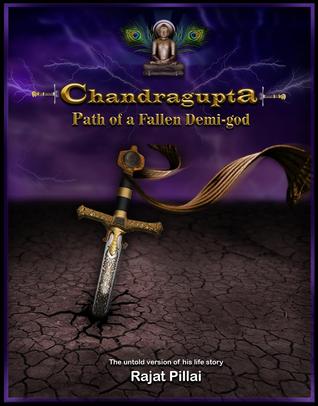Let me be done with the problematic bit first - language. Throughout the book, people 'laid down to sleep'. There were other editing mistakes that had slipped through, and being an editor myself, I can only wonder at what the original text looked like. Maybe the editor needs to be patted on the back for giving us a highly readable book despite these flaws.
The author has been involved with the theatre and maybe that's what gives him such a hold on the plot. His interest in history makes him scratch beneath the surface and present a highly plausible tale of one of the greatest kings in Indian history, despite which not much is known of his early days. So what Pillai writes of comes from his readings of the books mentioned in the Bibliography - most of which are about the agrarian economy in the times of the Nandas and the Mauryas.
My knowledge of the Maurya founder comes, like most other historical/mythological tales, from Amar Chitra Katha. I realise the lack in my education when I read authors who take this popular tales and dig deep.
For me, Chanakya was always the hero and Chandragupta Maurya, a beneficiary of his guru's infinite wisdom. Even in Ashwin Sanghvi's Chanakya, this view was strengthened.
Pillai, on the other hand, shows Maurya in a different light, with much more personality, skills and foresight. Even without his guru, he has mettle. His life is not all that smooth and he not a playful man having fun in life. He is a king, a responsible one, and morose, toughened by life and bereavements, betrayed by near and dear ones.
The journey is fleshed out neatly, logically and without any rose-tinted glasses colouring the picture. WYSIWG - What you see is what you get. You need to act to achieve your goal, but that does not always give you joy though it may give you the desired result.
A must-read for those who like historical fiction, and even those who don't. But, read with a liberal mind to forgive those errors in language for the purpose sometimes is larger than technical details.
The author has been involved with the theatre and maybe that's what gives him such a hold on the plot. His interest in history makes him scratch beneath the surface and present a highly plausible tale of one of the greatest kings in Indian history, despite which not much is known of his early days. So what Pillai writes of comes from his readings of the books mentioned in the Bibliography - most of which are about the agrarian economy in the times of the Nandas and the Mauryas.
My knowledge of the Maurya founder comes, like most other historical/mythological tales, from Amar Chitra Katha. I realise the lack in my education when I read authors who take this popular tales and dig deep.
For me, Chanakya was always the hero and Chandragupta Maurya, a beneficiary of his guru's infinite wisdom. Even in Ashwin Sanghvi's Chanakya, this view was strengthened.
Pillai, on the other hand, shows Maurya in a different light, with much more personality, skills and foresight. Even without his guru, he has mettle. His life is not all that smooth and he not a playful man having fun in life. He is a king, a responsible one, and morose, toughened by life and bereavements, betrayed by near and dear ones.
The journey is fleshed out neatly, logically and without any rose-tinted glasses colouring the picture. WYSIWG - What you see is what you get. You need to act to achieve your goal, but that does not always give you joy though it may give you the desired result.
A must-read for those who like historical fiction, and even those who don't. But, read with a liberal mind to forgive those errors in language for the purpose sometimes is larger than technical details.

